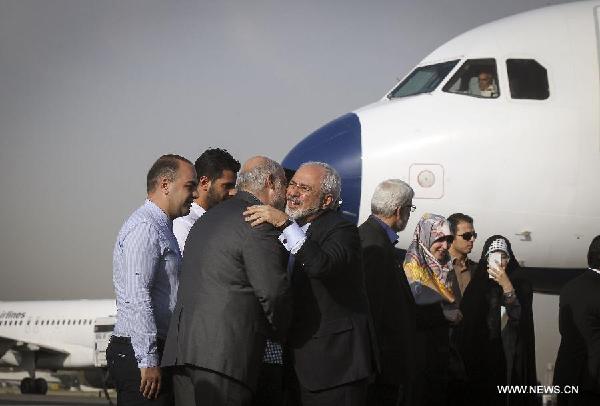Geopolitical ramifications of the Iran nuclear deal
- By Sumantra Maitra
 0 Comment(s)
0 Comment(s) Print
Print E-mail China.org.cn, July 16, 2015
E-mail China.org.cn, July 16, 2015
|
|
|
Iranian officials welcome Iranian Foreign Minister Mohammad Javad Zarif (R front) and other negotiators upon their arrival at Tehran's Mehrabad Airport, Iran, on July 15, 2015. Iran and six world major countries on Tuesday adopted an agreement on the Iranian nuclear issue that will put Iran on the path of sanctions relief but more strict limits on its nuclear program. [Xinhua/Ahmad Halabisaz] |
What a week it was! The Greek bailout deal went through strenuous negotiations in which Greece capitulated to every demand made by the European superstate, and a young radical, dreamy-eyed and well-intentioned but naïve prime minister learned that you can't feed yourself with ideology. Barely more than 100 years after our species learned to fly, one of our spacecraft is now officially flying past Pluto, the icy planet at the extremes of our solar system, billions of miles away from the tiny speck of celestial dust we call home. And in a region which for the last 4000 years has dealt with geopolitical and economic negotiations with the blade of the sword or more recently with guns and bombs, a historic deal about the world's most destructive weapon was signed by the world's foremost powers.
To be honest, a task well begun is only half done, and there are so many ways this deal can still be derailed. For a start, it needs to be ratified, not just in Iran but also in the United States. That is going to be a mighty job, as hardliners in both countries might try to rip the deal. It will be an especially hard sell in the United States, as with election season looming, every politico and presidential candidate wants to look tough on national security by facing down a country that is known as a traditional U.S. adversary.
Recent public opinion polls show that the percentage of people who dislike Obama is similar to the percentage of people who dislike the Iran deal, which is not really shocking. Similarly, in Iran, which thrives on legitimized anti-Americanism, it is curious how chants of "death to America" resonate with the other negotiators.
I have always maintained in my previous columns that the Iran deal is probably the best solution achievable in this particular scenario. I have also written that agreeing to a deal is the most rational thing to do. There are inevitably naysayers, but reason and logic dictate that the benefits of this deal outweigh its problems.
The core argument against this deal essentially holds that Iran is an apocalyptic regime hell-bent on the destruction of Israel and America and that it is uncontrollable in its wielding of proxies and pursuit of hegemony in the Middle East.
The fact is that both arguments are populist and resonate with a simplistic analysis of geopolitics, but both these arguments are also flawed. The Iranian regime is rational, and its primary goal is its own survival, as is the case with every other state on this planet. Iran knows full well that any attack on Israel or the United States would invite a massive and disproportionate response that would result in the obliteration of the Iranian regime.







Go to Forum >>0 Comment(s)